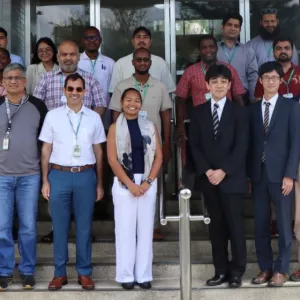Japan and IRRI's AGRI aims to reduce GHG emissions via CapDev and infrastructure improvements
Los Baños, Philippines (19 May 2025) — The Ministry of Agriculture, Forestry and Fisheries (MAFF) of Japan and the International Rice Research Institute (IRRI) officially launched a new initiative that aims to promote sustainable, low-carbon rice-farming in the ASEAN region. Called “Accelerating development and scaling of agricultural innovations for reducing greenhouse gas (GHG) emissions in ASEAN Countries” project (AGRI Project),

Japan and IRRI's AGRI aims to reduce GHG emissions via CapDev and infrastructure improvements
Los Baños, Philippines (19 May 2025) — The Ministry of Agriculture, Forestry and Fisheries (MAFF) of Japan and the International Rice Research Institute (IRRI) officially launched a new initiative that aims to promote sustainable, low-carbon rice-farming in the ASEAN region. Called “Accelerating development and scaling of agricultural innovations for reducing greenhouse gas (GHG) emissions in ASEAN Countries” project (AGRI Project), the initiative will focus on capacity building for partners, and infrastructure development to improve IRRI’s soil laboratory and upgrade its equipment for better efficiency.
Rice production accounts for 48% of cropland methane emissions and 11% of total agricultural GHG emissions worldwide. “There is huge potential to mitigate the impacts of climate change in rice production. The AGRI Project was conceptualized to contribute to development and scaling of agricultural innovations that can reduce emissions while maintaining productivity,” said Dr. Virender Kumar, IRRI Sustainable Impact through Rice-based Systems Department Research Director in his opening remarks during the Kickoff Program.
The AGRI Project will conduct trainings to build the capacity of researchers and partners in advanced GHG measurement techniques, data analytics, and measurement services. These include the “Training on GHG Emissions in Rice Systems: Basics of Mechanisms and Standards for Measurements,” which was held immediately following the AGRI project’s Kickoff Program.
Through the AGRI project, IRRI’s soil laboratory will also be upgraded. State-of-the-art equipment including additional units of Gas Chromatography (GC) will be purchased. The GC will enable accurate measurement of GHG emissions.
“It is inspiring to witness such a dedicated gathering of colleagues, partners, and experts committed to advancing climate-resilient agriculture and sustainable rice farming systems across ASEAN,” said Dr. Anilyn Maningas, IRRI Education Head.
Mr. Seisuke Inoue, MAFF Japan Director of International Research Collaboration Division, emphasized the urgent need for collective action. “Building on…

